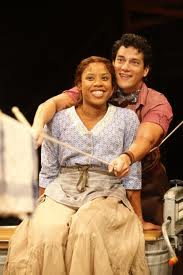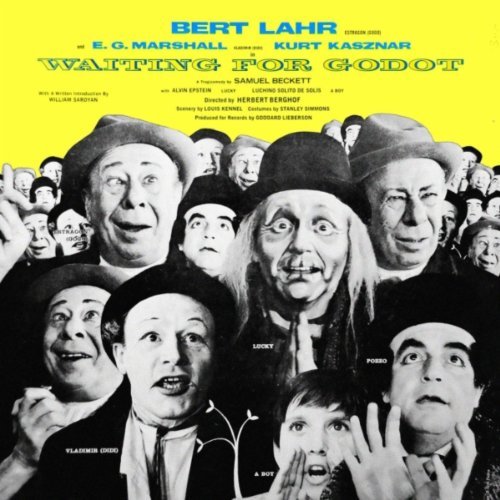Samuel Beckett, Waiting for Godot (Hallmark). You never know until you look. The much-coveted Columbia Masterworks double-LP set of the original 1956 Broadway production of the most influential play of the twentieth century–complete and unabridged–was sneaked into print earlier this year as an mp3-only download. Now you can hear Bert Lahr, E.G. Marshall, Kurt Kasznar, and Alvin Epstein (the last of whom is, glory be, still with us!) performing Samuel Beckett’s masterpiece with supreme, sublime theatricality. No program notes, alas, so to read about how the Herbert Berghof-directed production took shape, read the relevant chapter in Notes on a Cowardly Lion, John Lahr’s wonderful 1969 biography of his father–but do that later. Right now, go straight to your computer, download this album at once, and listen to what the Cowardly Lion made of Estragon. The price? $3.56. Believe me, you’re never going to get a better deal on anything as long as you live (TT).
Archives for November 26, 2010
TT: An O.K. Oklahoma!
In today’s Wall Street Journal drama column I review two shows, one in Washington, D.C. (Arena Stage’s Oklahoma!) and one off Broadway (the world premiere of Neil LaBute’s The Break of Noon). Here’s an excerpt.
* * *
Corny, charming, and as handsomely made as a hand-sewn quilt, “Oklahoma!” is one of the permanent landmarks of American musical theater. Though scholars continue to quarrel over whether the first of the Richard Rodgers-Oscar Hammerstein II collaborations was also the first “integrated” musical–a show, that is, in which music, lyrics, book and choreography all work together to advance an emotionally serious plot–contemporary audiences don’t care whether it deserves priority over, say, “Pal Joey” or “Porgy and Bess.” Either way, they like it fine, and show no signs of longing for some fancy director to treat it to a high-concept staging. Nor has Molly Smith, the artistic director of Arena Stage, done anything of the kind. Ms. Smith’s “Oklahoma!” is a perfectly, almost baldly straightforward production that deviates from the norm in only two ways: It is performed in the round by a multicultural cast whose members include a Latino Curly (Nicholas Rodriguez) and a black Laurey (Eleasha Gamble). Otherwise, this is much the same “Oklahoma!” that your grandfolks loved.
 Is that good enough for 2010 and the inaugural production of the newly built Mead Center for American Theater? Arena Stage’s enthusiastic audiences clearly think so, and up to a point I’m inclined to agree with them. Ms. Smith’s unselfconsciously lively staging, after all, is full of the high-stepping energy without which no production of “Oklahoma!” can hope to make its mark. What I miss, however, is any sense that we’re being told something about the show that we didn’t already know….
Is that good enough for 2010 and the inaugural production of the newly built Mead Center for American Theater? Arena Stage’s enthusiastic audiences clearly think so, and up to a point I’m inclined to agree with them. Ms. Smith’s unselfconsciously lively staging, after all, is full of the high-stepping energy without which no production of “Oklahoma!” can hope to make its mark. What I miss, however, is any sense that we’re being told something about the show that we didn’t already know….
Neil LaBute is back again, and I wish I could say that he’s returned to form after a long, dull stretch. No such luck. “The Break of Noon,” like all of his plays since “Fat Pig,” starts strong, loses steam and drifts all over the road before coasting to a dead stop.
Part of the problem is that Mr. LaBute is seeking this time around to breathe life into a musty plot twist that dates back to Edwardian times: How might the modern world respond to a person who claims that God has spoken to him? In this umpteenth iteration, we get a regular-guy businessman named, predictably enough, John Smith (David Duchovny). The only survivor of a mass murder, John believes that God told him midway through the shootings that “you shall be saved.” The experience transforms him, though not so much as to prevent him from capitalizing on the transformation by selling his story to the media, and for the rest of the evening we watch him interact with a string of skeptics, including his ex-wife (Amanda Peet), a cynical talk-show host (Tracee Chimo) and the detective in charge of his case (John Earl Jelks), all of whom are variously disinclined to take his implausible tale at face value.
As usual with Mr. LaBute, the first scene, a monologue in which John tells what happened on the fatal day, is pointed and powerful, but nothing that happens thereafter is half so fresh…
* * *
Read the whole thing here.
TT: The Cowardly Lion’s bravest night
 I rejoice to report that the 1956 recording of the first Broadway production of Waiting for Godot, starring Bert Lahr, is finally back in print. Since no one else in the world seems to be aware of this wonderful fact, I decided to announce it to the world in my “Sightings” column for today’s Wall Street Journal. Here’s an excerpt:
I rejoice to report that the 1956 recording of the first Broadway production of Waiting for Godot, starring Bert Lahr, is finally back in print. Since no one else in the world seems to be aware of this wonderful fact, I decided to announce it to the world in my “Sightings” column for today’s Wall Street Journal. Here’s an excerpt:
Every critic who covered the show heaped praise on Lahr, and the most perceptive ones saw that his performance was profoundly true to the spirit of the play. Though Lahr was no kind of intellectual, he had instinctively understood what Beckett was up to. “I know it’s supposed to be tragic, but there are lots of gags,” he told his agent after reading the script. So there are, for “Godot” is a Laurel-and-Hardyesque farce about the meaninglessness of life. Even those critics who, like Brooks Atkinson of the New York Times, found it hard to stomach the play’s dark vision were staggered by the crazed beauty of Lahr’s acting: “His long experience as a bawling mountebank has equipped Mr. Lahr to represent eloquently the tragic comedy of one of the lost souls of the earth.”
Alas, “Godot” closed after just 10 weeks, and Lahr never appeared in it again. But Goddard Lieberson, who produced original-cast albums for Columbia Records, had the brilliant idea to record a complete performance of the play. The existence of the resulting album, which has been out of print for the past quarter-century, is no secret, but its long-standing unavailability has caused it to be overlooked by most people who write about “Godot.” Even John Lahr, the comedian’s younger son, fails to mention it in “Notes on a Cowardly Lion,” the uniquely perceptive biography of his father that he wrote in 1969.
It is, therefore, stop-press news for anybody who loves great theater that the 1956 recording of “Godot” is available once again, not as a CD but as an mp3-only sound file that you can download from Amazon for $3.56 or from iTunes for $5.99. (You can find it on either site by searching for “Bert Lahr.”) Culturally speaking, I’d call that the deal of the decade….
The 1956 production of “Godot” was Lahr’s show all the way, and to hear it now is to boggle at his seemingly infinite comic resourcefulness. He whines, he whimpers, he chortles, he grunts, giving each line precisely the right flavor. Yet never for a moment does his clowning conceal the play’s underlying pathos, and whenever he opens his mouth, it’s always Beckett, not Bert Lahr, that you hear….
Read the whole thing here.
TT: Almanac
“The fact is that the average man’s love of liberty is nine-tenths imaginary, exactly like his love of sense, justice and truth. He is not actually happy when free; he is uncomfortable, a bit alarmed, and intolerably lonely.”
H.L. Mencken, Baltimore Evening Sun, Feb. 12, 1923
